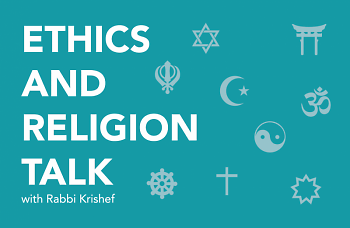The question: Although medical groups tend to be positive or neutral regarding circumcision, there are an increasing number of organizations and voices devoted to anti-circumcision legislation. Does your tradition have a position on a circumcision for religious reasons? Does it have a position on the legal banning of infant circumcision?
Linda Knieriemen, Senior Pastor at First Presbyterian Church in Holland, responds:
“The PCUSA does not have a religious position on male infant circumcision. It is understood as a medical question. If I were ever asked I would refer the questioner to their pediatrician. Baptism, not circumcision is the Christian sacrament spiritually marking the individual as belonging to the community of faith.”
Fred Stella, the Pracharak (Outreach Minister) for the West Michigan Hindu Temple, responds:
“There is no custom of circumcision in Hinduism. Since I was born in the US in the 1950s I underwent the procedure. Out of curiosity I’ve read several opinions on it. At this point I’ve not been able to discern a solid position that could be used to defend or oppose the practice. To the best of my knowledge, no Hindu thought leaders have voiced ideas on this subject.”
Rev. Ray Lanning, a retired minister of the Reformed Presbyterian Church of North America, responds:
“Presbyterians regard circumcision as a sacrament of the Old Testament, valid in its time and place as the sign and seal of God’s covenant of grace (Genesis 17:10), but now replaced by the sacrament of baptism, which the apostle Paul describes as ‘the circumcision of Christ’ (Colossians 2:10-12), that is, the means appointed by Christ, by which Christians are identified and received into the fellowship of His church. In the days of the apostles, circumcision became a matter of controversy, when Gentile believers were first received into the church by baptism. Some Jewish believers insisted that these Gentiles must also be circumcised, but the first synod of the Christian church decided to the contrary (Acts 15).
“But if circumcision can be shown to be beneficial on medical grounds, Presbyterians have no objection to the practice of infant circumcision. In my own judgment, those medical grounds are substantial and persuasive, but each Presbyterian may decide for himself. In some cases, circumcision is medically necessary to remedy a painful condition known as phimosis. The practice of female ‘circumcision’ has only recently become known in our part of the world, and Presbyterians should oppose it, as something not commanded in God’s Word at any time, and known to be harmful to those subjected to it.”
Father Kevin Niehoff, O.P., a Dominican priest who serves as Judicial Vicar, Diocese of Grand Rapids, responds:
“The Catholic Church teaches that ‘circumcision is a liturgical sign of the Old Covenant along with anointing and consecration of kings and priests, laying on of hand, sacrifices, and above all the Passover’ (Catechism of the Catholic Church, p. 296.) This teaching is not an indictment of the Old Covenant. No, these are ‘signs that prefigure the sacraments of the New Covenant’ (ibid.), which are baptism, reconciliation, Eucharist, confirmation, marriage, ordination, and anointing of the sick.
“No, the Catholic Church does not have a position on circumcision for religious reasons. It does not ban infant circumcision. The decision to circumcise a male child is entirely up to his parents.”
The Reverend Colleen Squires, minister at All Souls Community Church of West Michigan, a Unitarian Universalist Congregation, responds:
“Unitarian Universalism does not require circumcision. We do not have an official statement on the subject. We would consider this to be a health issue and we believe all medical decisions should be made by the patient or the child’s guardian in consultation with their medical care provider.”
My response:
Judaism is clearly leading the pro-circumcision parade. We consider it to be a fundamental sign of the covenant between human beings and God. It is perhaps the most ancient of Jewish practices, taking place on the eighth day of a baby boy’s life, unless medical considerations cause a delay. For much of the late 19th and 20th centuries, Jews didn’t need to put much thought into circumcision because virtually all North American infant boys were routinely circumcised as a cultural practice. Today, however, with a growing cultural movement against circumcision, Jewish parents are once again asked to make the somewhat counter-cultural choice to circumcise their boys. It is becoming more of a positive religious affirmation of their identification as a Jewish household.
In addition, circumcision is part of the ritual of conversion to Judaism for boys and men. For those who are already circumcised, there is a ritual of drawing a drop of blood from the site of the circumcision, to transform a medical procedure into a covenantal act.
The Jewish community takes the position that legislation banning or restricting male circumcision is a violation of our religious freedom.
This column answers questions of Ethics and Religion by submitting them to a multi-faith panel of spiritual leaders in the Grand Rapids area. We’d love to hear about the ordinary ethical questions that come up in the course of your day as well as any questions of religion that you’ve wondered about. Tell us how you resolved an ethical dilemma and see how members of the Ethics and Religion Talk panel would have handled the same situation. Please send your questions to [email protected].
The Rapidian, a program of the 501(c)3 nonprofit Community Media Center, relies on the community’s support to help cover the cost of training reporters and publishing content.
We need your help.
If each of our readers and content creators who values this community platform help support its creation and maintenance, The Rapidian can continue to educate and facilitate a conversation around issues for years to come.
Please support The Rapidian and make a contribution today.
